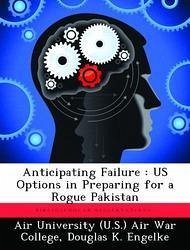
Anticipating Failure: Us Options in Preparing for a Rogue Pakistan
Versandkostenfrei!
Versandfertig in über 4 Wochen
52,99 €
inkl. MwSt.

PAYBACK Punkte
26 °P sammeln!
"In the absence of significant internal reform, Pakistan faces a host of internal problems and external tensions that make the emergence of a failed, radical Islamist, nuclear-armed state a possible worst case scenario within 10 to 15 years. This potential emergence of a rogue Pakistan threatens several vital US interests. The U.S. relies on a stable, moderate Pakistan as a key partner in US counter-terrorism efforts and is a key player in maintaining stability in the highly volatile region. In addition, a failed Pakistan threatens nuclear non-proliferation efforts, promises a destabilizing re...
"In the absence of significant internal reform, Pakistan faces a host of internal problems and external tensions that make the emergence of a failed, radical Islamist, nuclear-armed state a possible worst case scenario within 10 to 15 years. This potential emergence of a rogue Pakistan threatens several vital US interests. The U.S. relies on a stable, moderate Pakistan as a key partner in US counter-terrorism efforts and is a key player in maintaining stability in the highly volatile region. In addition, a failed Pakistan threatens nuclear non-proliferation efforts, promises a destabilizing regional nuclear arms race, and increases the chances of nuclear weapons or materials falling into the hands of radical Islamists with an expressed desire to both acquire and use WMD. While US policy should aim to prevent this catastrophe, this paper examines how US strategy must also prepare for a rogue Pakistan in the event prevention fails. This paper examines the potency of the Pakistans trend towards failure, the significance of a failed Pakistan to US interests in the region, and assesses US regional policy options in preparing for its failure. This assessment concludes that military options offer little utility in countering this threat except in rare and unlikely circumstances, and that limits to US power will lead to a US strategy of management and containment of a rogue Pakistan aimed at minimizing the effects of its failure. As a result, US regional policy in preparing for a possible failed Pakistani state should focus on five areas: first, increasing nuclear safety and security in the region; second, increasing our diplomatic and economic development efforts and influence in the region to include a strong alliance with India and diplomatic engagement with Iran; third, accelerating stabilization and nation building efforts in Afghanistan; and fourth, synchronizing all of our efforts by expanding our "soft" instrument of power. "




